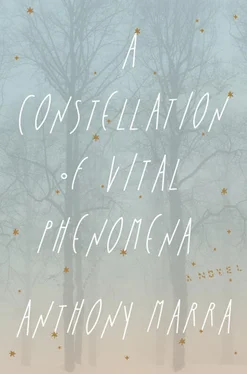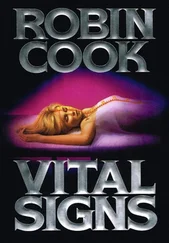“Will the Feds take me to my father?” she asked, while knowing the question had no answer she wanted to hear. Her father was her door to the world; he was the singular opening through which she saw, heard, and felt. Without him she didn’t know what she saw, or what she heard, and what she felt; all she felt, was him gone.
“Let’s go to bed,” Sonja said. Still holding Havaa’s hand, she stood. “We close our eyes and there they are, right where we left them, in their own waiting room, waiting for us.”

FOR EIGHTEEN DAYS Natasha slept as if her lidded dreamland were her true home, to which she was repatriated for fifteen hours a day. So what, then, could Sonja do? Natasha was here, safe, alive, and real enough to begin resenting. In the flat white light of morning she entered her sister’s bedroom, a cup of hot tea in her hand, and inspected her sister’s body as she might a corpse, or a comatose patient, or someone whom she had, once, long ago, envied. Her gaze crawled the curves of Natasha’s hips, the odd angle of elbows she could unhinge and bend at will, the bitten rims of fingernails, her legs, still long, still lithe, and the little brown hairs on her forearms, which, when they had first appeared in puberty, Sonja had used as evidence to convince Natasha she was turning into a boy. Natasha’s skin said what she wouldn’t. The scars of habitual heroin use webbed her toes. A buckshot of cigarette burns stippled her left shoulder. If Sonja found these scars on a patient in the hospital, she wouldn’t feel pity, but in Natasha’s bedroom, she felt it all over. For eighteen days she went to wake Natasha and turned back, afraid of the dreams her sister would rise from, leaving no alarm louder than a cup of tea cooling on the nightstand.
But Natasha wasn’t right. On the eighteenth evening, standing at the cutting board, chopping two onions and a potato, Sonja broached the subject. “I think you should talk to a psychiatrist or someone.”
From the look her sister gave her, she might have announced they’d be eating the cutting board for dinner.
“I just think it would be good for you to talk with someone. About what happened in Italy. About what it’s like being home,” Sonja said.
“Talking doesn’t do anything.”
“It might do one or two things.” Sonja punctuated her sentence with a chop.
“All the words in the world won’t put those onion halves back together.”
“The human mind is a little more complex than a yellow onion.”
Natasha held back her hair as she lit a cigarette from the hot plate her father had, twelve years earlier, purchased secondhand from a woman who would never find a flame that cooked an egg quite as well. “Some of us would be lucky to have something as large as a yellow onion between our ears.”
Sonja could see her sister backing away from her, from the subject, from whatever had happened in Italy. “Think of the mind as a muscle or bone instead,” she said, looking down to address the more respectful audience of cubed potatoes. “Emotional and mental trauma doesn’t heal itself any more than a broken bone left unset.”
Natasha nodded to the cutting board. “You talk those potatoes and onions into jumping in that frying pan and I’ll talk with a psychiatrist.”
Despite its monumental aggravation, Natasha’s resistance was a good sign, wasn’t it? The obstinacy was a pillar running alongside her spine that would support her when not lodged firmly in Sonja’s hindquarters. And while she might yearn for a little civility to grease the rusty gears of their relationship, she gladly endured the backtalk and eye-rolls to know that Natasha hadn’t lost the ability to drive her fucking crazy. Her sister was a snarky chain-smoking hermit crab that emerged from her shell in the safety of Sonja’s presence. When Natasha believed she was alone — those days when Sonja slammed the front door and stayed to spy on her — she searched for thicker shells. It was awful, watching Natasha through the keyhole as she divided her room into smaller increments of shelter. She moved the desk, bed, and bureau like a child arranging the furniture into a make-believe castle, even encircling the structure with a moat of water glasses. On the keyhole’s far side, Sonja prayed it would keep the dragons at bay; her heart, as if drawn on a piece of paper in her chest, crumpled every time. When she returned in the evening, the fortress was disassembled and the pieces of furniture had returned to their white rectangles of wall space. She never mentioned what she’d seen, holding it as a reminder to be gentle and patient as she prepared dinner. She whispered sweet nothings to the potatoes and onions, but the little fuckers were as stubborn as her sister, the great big fucker.
Natasha relented when Sonja pointed out that compared with her inexhaustible exhortations, a chat with a psychiatrist would be as pleasant as a summer picnic. She admitted to having spoken with a psychiatrist at the women’s shelter in Rome — the one that had provided the six-month supply of Ribavirin, which Sonja found in the bathroom, which was generally used to treat hepatitis, which Natasha refused to admit she had, which Sonja thought was total bullshit.
“She spoke Russian in this ridiculous Italian accent,” Natasha said. “I was always afraid she’d start singing an opera.”
“I never make promises to my patients, but I promise that whoever I find won’t speak a word of Italian.”
And she tried. She combed through her contacts only to find that every psychiatrist in the city was dead, exiled, or missing. The ranks of the hospital staff didn’t contain a single mental-health professional. She fumed one afternoon in the hospital parking lot, wanting to punch the clouds from the sky but instead venting on a closer object, the hood of an ’83 Volga so decrepit she felt the sickening thrill of beating a wounded animal to reiterate its pain. How had she got to this point? She was fluent in four languages and yet her fists against the rusted hood were the fullest articulation of her defeat. In the months before the repatriation her heart had hardened around her sister’s absence, letting her love Natasha in memory as she could never love her in reality. The fact was that her exile had prompted Natasha’s. The fact was that she had left Chechnya first. The fact was that she had escaped the war Natasha had endured alone. It only made sense that her sister would attempt the same transaction with the only currency she possessed: her body. But now she was home and needed medical care Sonja couldn’t provide. Being a bad sister was one thing; being a bad doctor was the more serious sin. Deshi found her out in the parking lot, beating the rust off the Volga hood. Her tears turned brown when she wiped them with her knuckles. “Do you want to talk about it?” Deshi asked. “Go to hell,” she replied.
At dinner Natasha took the news with typical smugness. “It’s just as well,” she said. “Head doctors are a decadence unsuited to a country like ours. They are the bidets of the medical profession.”
“You could talk to me,” Sonja offered with enough snarl in her voice to ensure that Natasha would demur. Which she did. In seven years and three weeks, when Natasha disappeared for a second time, Sonja would orbit that moment, circling every angle without ever touching down: what if she had tried harder, been kinder, gentler?
As the street noise filled the gap in the conversation, Sonja gave up. If the world was determined to drown her, she’d stop swimming. She lengthened her hours at work, then lengthened her commute. At the bazaar, vendors sold everything that could be lifted and carted away: emergency rations, grain sacks, spools of uncut cloth, raw wool, floorboards, industrial kitchen appliances, abandoned Red Army munitions, traffic lights, and oil-refining machinery. She wandered past racks of used shoes that had clocked more kilometers than the average Federal fighter jet, past blocks with more craters than her sister’s left shoulder blade, past exoskeletal scaffolding, workmen hoisting wheelbarrows of masonry, all the way to Hospital No. 6.
Читать дальше












